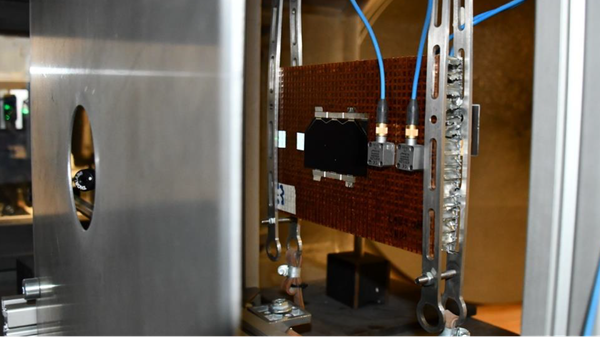Experimental setup for the investigation of structural vibrations of a sandwich structure as well as micrometeorite impacts on a photovoltaic cell

The commercialization of space exploration causes an increased demand for innovative technological solutions for the realization of space and planetary exploration or commercial and scientific satellite missions. To ensure safety and reliability of space structures, evaluation of their structural integrity (especially during operational use) is essential. However, harsh environmental conditions (e.g., radioactive radiation, outgassing and oxidation effects, high temperature fluctuations) have the potential to accelerate material degradation and wear and tear, and to degrade the service life of space systems. In addition, there is an ever-present risk of micrometeorite impacts, which can cause severe structural damage as a result of high relative velocities (in some cases > 20 km/s). Due to the growing number of satellite missions operating in low-Earth orbit, the probability of collision events caused by fragmented small parts or space debris is increasing at the same time. ESA estimates the number of particles > 1 cm in size to exceed one million, while only 30,000 of these objects are cataloged and monitored by the Space Surveillance Network. Space debris collision events and micrometeorite impacts can cause structural damage, impair subsystem functionality, and, in the worst case, jeopardize the entire mission.
Conventional (non-destructive) testing methods are not feasible or are limited during the mission duration. For this reason, in-orbit evaluation of the health of mission-critical structures and systems is necessary to monitor the occurrence of singular events (e.g., damage due to collision events) as well as the degradation process. Structural health systems have proven their technological maturity as a non-destructive testing method in a variety of industries and terrestrial applications. The logical consequence is now the transformation and qualification of established monitoring approaches and systems into space, which is implemented within the SeRANIS project by the flight experiment "Structural Event Monitoring" for vibration-based structural monitoring. By integrating a prototype on the SeRANIS research satellite Athene-1, vibration data from low-Earth orbit will be made available to further improve Space Situational Awareness (SSA) and form the basis for further research efforts.
The overall experimental goal is to develop methods for the realization of an in-orbit monitoring system for the detection of collision events of small satellites with micrometeorites and space debris based on collected oscillation data during the operational use of the satellite. In addition, a prototype will be integrated on the Athene-1 research satellite and tested over a mission period of min. 2 years. Therefore, software- and hardware-based research questions will be investigated within the SeRANIS project:
Prototype development:
Algorithm development:
Establishment of a scientific database:
The overall research goal is to realize an in-orbit monitoring system to detect collisions of small satellites with micrometeorites and space debris based on measured vibration data during the operational use of the satellite. The SeRANIS project will parallelize software- and hardware-based research phases:
The research paths listed above include basic signal processing investigations based on structural vibration data, numerical optimization techniques and simulations, and experimental campaigns. The following scientific or technical experimental and project goals can be formulated:
Scientific Objectives:
Technical Objectives: